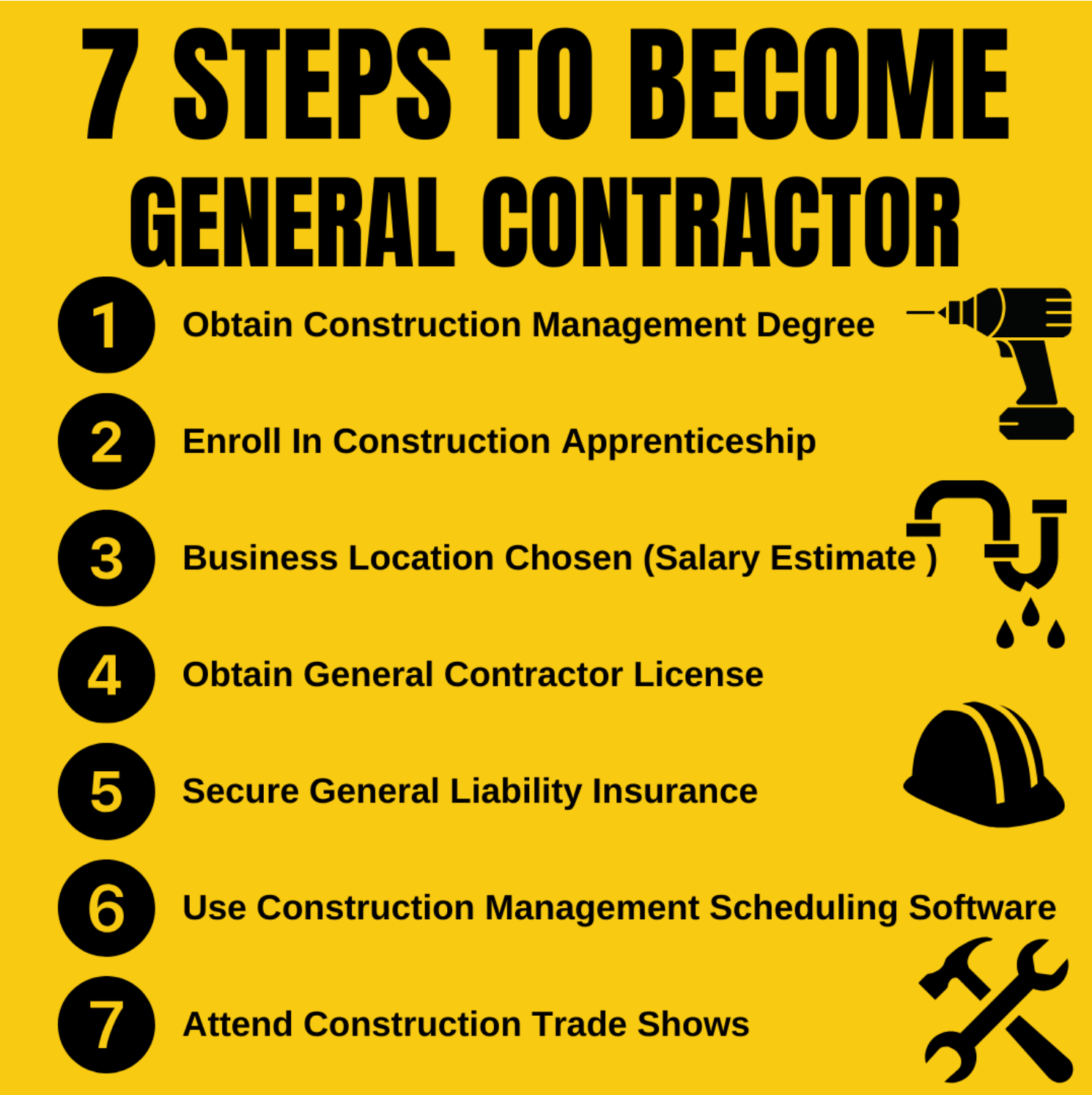How to Become a General Contractor: 7-Step Complete Guide
Discover how to become a general contractor with our 7-step guide. From earning a construction degree and completing an apprenticeship to understanding salary, licensing, insurance, and using construction management software, we cover everything you need for success. Plus, explore top trade shows for networking
by Sam Chen
|
What do General Contractors do?
A general contractor oversees every aspect of a construction project from start to finish. Skills for general contractors include construction scheduling, applying building permits, hiring subcontractors, purchasing materials, and ensuring that the project adheres to building codes. They manage a wide range of projects, from residential homes to commercial buildings, while keeping clients updated on progress.

Step 1: Obtain Construction Management Degree
To become a general contractor in the USA, a high school diploma or GED is the minimum requirement, but many pursue a degree in construction management. A bachelor’s or master’s construction management degree covers essential topics such as skills for construction worker, construction methods, blueprint reading, safety protocols, building codes, contracts, scheduling, and business management.
Alternatively, a trade school or an apprenticeship through organizations like the Associated General Contractors of America (AGC) can provide valuable hands-on experience. Each state has specific licensing requirements, so it’s important to check if additional training or certifications are needed before applying for a general contractor license.
Step 2: Enroll in Construction Apprenticeship
Gaining practical experience is crucial for aspiring general contractors. Many states require at least four years of experience at the journeyman level within the last ten years to qualify for a general contractor’s license.
Apprenticeships, often offered by unions and professional organizations, provide structured programs combining coursework with on-the-job training. This allows individuals to earn money while learning the trade. Apprenticeships typically last up to four years and offer a strong foundation for pursuing a general contractor career.
As you gain experience, consider earning certifications in specialized trades like plumbing, HVAC, or electrical work to increase your qualifications and marketability.
Step 3: How Much Do Contractors Make (Business Location Chosen)
The earning potential for general contractors varies significantly depending on location and the types of projects managed. According to Indeed, the general contractor average salary in the U.S. is $88,077 per year.
Top cities for general contractor pay rate include:
Factors such as winning bids, managing costs, and focusing on high-demand sectors like commercial construction can further increase your earning potential. Additionally, managing operations effectively during slower seasons will help ensure financial stability throughout the year.
Step 4: Obtain General Contractor License
Each state has unique requirements for obtaining a general contractor's license, and sometimes, cities or counties have their own regulations. It’s crucial to research the specific requirements in your area. Below, we provide an overview of common licensing requirements and a closer look at the requirements in several key states.
Common Requirements for General Contractor Licensing
- Age: Must be at least 18 years old
- Work Authorization: Must have legal eligibility to work in the U.S.
- Education: A high school diploma or GED is typically required
- Experience: Previous construction experience is usually necessary
- Exams: Must pass a contractor’s licensing exam, which often covers construction methods, laws, and business practices
- Insurance: Proof of general liability insurance or bonding may be required
State-Specific Licensing Requirements
1. State of California General Contractors License
Licensing Scope: Required for projects over $500.
License Types:
- Class A (General Engineering Contractor): For specialized engineering projects
- Class B (General Building Contractor): For projects involving two or more unrelated trades (excluding framing and carpentry)
- Class B2 (Residential Remodeling Contractors): For non-structural residential wood-frame projects with at least three unrelated trades
- Class C (Specialty Contractor): Covers specialized trades across 41 classifications
Qualifications:
- Four years of experience in the classification you’re applying for within the last 10 years
- Must pass trade, business, and law exams
- Complete a background check
- Provide proof of general liability insurance and a $25,000 surety bond or cash deposit
2. Florida General Contractor License
Licensing Scope: Contractors must be licensed and registered
License Types:
- Certified License: Allows contractors to work statewide
- Registered License: Restricts work to specific local areas
Contractor Classifications:
- Residential Contractor: Handles residential buildings up to two stories
- Building Contractor: Covers both residential and commercial buildings up to three stories
- General Contractor: No restrictions; requires at least one year of construction experience and allows work on structures over four stories
Requirements:
- A minimum of four years of work experience (or three years of education plus one year of experience)
- Must pass trade, business, and law exams
- Submit a financial statement proving financial stability
- Provide proof of general liability and workers' compensation insurance
3. Georgia General Contractor License
Licensing Scope: Required for projects over $2,500
License Types:
- General Contractor: For private, commercial, and public projects
- General Contractor—Limited Tier: Similar to the General Contractor license but with financial limits
- Residential-Basic Contractor: Focuses on one- and two-family detached homes up to three stories
- Residential-Light Commercial Contractor: Includes multifamily and light commercial buildings
4. General Contractor License Texas
Licensing Scope: There is no statewide general contractor license, but local governments may have specific licensing rules. Even though a state license isn't required, contractors in Texas should still comply with the following to run a legitimate business
Local Licensing
Cities and counties may require contractors to register and obtain a permit to operate. Requirements and fees will vary depending on the location
Business License
All general contractors must register their businesses with the Texas Secretary of State and comply with local tax laws
Insurance Requirements
- General contractors are typically expected to carry general liability insurance to protect against property damage and injuries
- Workers’ compensation insurance is not mandatory in Texas but may be required by certain projects or municipalities
Specialty Trades
If your work involves specific trades such as plumbing, HVAC, or electrical work, you will need a state-issued license for those professions from the Texas Department of Licensing and Regulation (TDLR)
5. North Carolina General Contractors License
Licensing Scope: Required for projects valued at $30,000 or more
License Classifications:
- Limited License: For projects up to $750,000
- Intermediate License: For projects up to $1.5 million
- Unlimited License: No restrictions on project value or size
Requirements:
- Must be at least 18 years old
- Demonstrate good moral character as determined by the licensing board
- Provide proof of financial responsibility
- Pass trade and business exams administered by NASCLA
6. Alabama General Contractors License
Licensing Scope: Contractors need a license for commercial or industrial projects worth $50,000 or more, and residential projects worth $10,000 or more
License Types:
- Commercial License: For larger commercial and industrial projects
- Residential License: For residential projects of up to three stories or four units
Requirements:
- Proof of U.S. citizenship or lawful residency
- Registration for a business license in Alabama
- Current general liability insurance
Step 5: Secure General Liability Insurance for Contractors
As a general contractor, it’s essential to protect your business with the right insurance coverage. Here are the key types of insurance you’ll need:
- General Liability Insurance: Covers business risks such as accidents on your property or damage to client property.
- Business Owner’s Policy (BOP): Combines general liability and commercial property insurance, often at a lower cost than buying each policy separately.
- Workers' Compensation Insurance: Mandatory in most states for businesses with one or more employees. It covers medical expenses and lost wages for injured workers.
- Contractor’s Tools and Equipment Insurance: Covers the repair or replacement of your tools in case they’re lost, stolen, or damaged.
- Professional Liability Insurance (Errors & Omissions): Protects against legal claims from dissatisfied clients over project mistakes or missed deadlines.
- Surety Bonds: These guarantee that you’ll deliver on your contract. Often required to obtain a general contractor license.
When contractors hire uninsured workers, they may face additional costs and liabilities. This is where contractor general liability withholding for uninsured workers comes into play. Contractors are required to carry general liability insurance to protect against property damage or injuries on the job. If a subcontractor or worker doesn't have their own insurance, the contractor’s policy may need to cover any claims, potentially driving up premiums or leading to legal challenges. To avoid this, contractors may withhold part of payments to cover the risk. In some states, contractors are legally required to verify that all workers, especially those in high-risk trades, have insurance before starting work. Failing to ensure proper coverage can result in financial strain and increased legal exposure for contractors.
Step 6: Use Construction Management Scheduling Software

As a general contractor, juggling multiple responsibilities can quickly become overwhelming. Your role encompasses a broad range of tasks, including scheduling the project timeline, securing necessary permits, managing subcontractors, ordering materials, overseeing budgets, and ensuring compliance with legal regulations. Each of these components is vital to the successful execution of a construction project, and even minor oversights can lead to significant delays and cost overruns.
This is where construction management scheduling software, such as GoBuid, can be a game-changer. Offering a 30-day free trial, GoBuild provides comprehensive tools designed to streamline your operations and reduce the burdens that come with managing a construction project. Here’s how it can enhance your workflow:
- Workforce Management: Track labor hours, allocate resources efficiently, and ensure that your team is working effectively on-site. This feature helps you optimize your workforce and address any shortages or overlaps in labor.
- Project Scheduling: Create detailed project timelines that outline each phase of the construction process. With scheduling tools, you can visualize deadlines, set milestones, and make adjustments in real time, ensuring that everyone is on the same page.
- Equipment Tracking: Keep tabs on your equipment inventory, usage, and maintenance schedules. This feature not only helps prevent costly downtime but also ensures that you have the right tools available when needed.
- Cost Control: Monitor project costs closely with budget management tools that track expenses in real-time. This allows you to identify potential overruns early and adjust your spending accordingly, protecting your profit margins.
- Legal Paperwork Management: Managing contracts, permits, and AIA billing applications can be tedious and prone to errors. With dedicated features for legal documentation, you can ensure that all paperwork is organized and accessible, reducing the risk of compliance issues.
Step 7: Attend Construction Trade Shows & Construction Conference
Attending industry events is crucial for staying updated on the latest trends and building valuable connections. Here are some key construction trade shows for general contractors:
- NAHB International Builders’ Show (IBS): One of the largest construction trade shows, attracting over 100,000 attendees and 1,500 exhibitors. It’s a great place to learn about new trends and innovations.
- World of Concrete: Held in Las Vegas, this premier event draws over 55,000 attendees and 1,500 exhibitors, showcasing the latest concrete and masonry products.
- AIA Conference on Architecture: A major event for architects, featuring over 200 educational sessions and hundreds of exhibitors showcasing cutting-edge design products.
- ConExpo/Con AGG: North America’s largest construction trade show, featuring 1,800 exhibitors and covering the latest in construction equipment and technology.
- Greenbuild International Conference and Expo: Focuses on sustainable building practices, offering insights into eco-friendly construction and materials.
- ENR Future Tech: This event covers the latest innovations in construction technology, such as digital solutions, robotics, and smart buildings.
- Construction Financial Management Conference (CFMC): Offers guidance on managing finances, taxes, and risks in the construction industry.
Final Thoughts
Becoming a general contractor requires dedication, hands-on experience, and a strong understanding of the industry. By following these steps, securing the right education, gaining experience, obtaining a license, and leveraging tools like construction management scheduling software, you can build a successful career. Stay proactive by attending construction trade shows, networking, and continuously improving your skills to stay ahead in the ever-evolving construction field.
